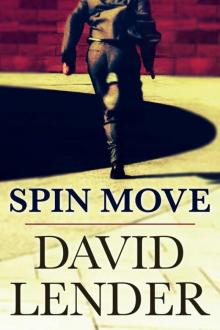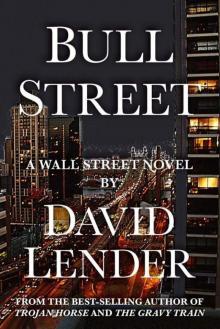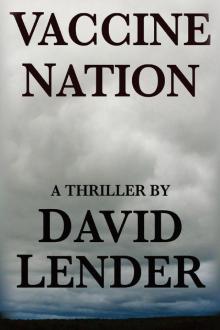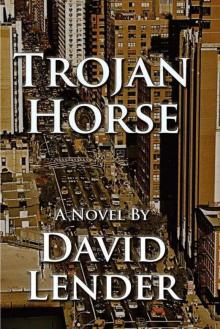- Home
- David Lender
Trojan Horse Page 2
Trojan Horse Read online
Page 2
Sasha jumped to her feet and ran down the corridor. She saw six squad members near the window, leaping out and down the rope each in turn. By the time she reached the window they were all down the rope. She leapt over the top without looking down. As she slid down the rope she listened for the sound of the three BMW 535s she knew the squad would have waiting for their escape. They were her only hope. But she couldn’t hear them. She could only hear the pounding of her heart in her ears and the ringing from the sharp blasts of the guns and that malevolent C-4 blast. She knew she was beginning to think again and not just act on instinct and adrenaline and the passion of what she believed in, and she realized she might survive, and that even with the disastrous intervention of the Saudi guards, and her split-second improvisation, the plan hadn’t gone so horribly awry.
Sasha ran for the hole in the perimeter wall. At ten meters away from it she heard the staccato bursts of Uzis from two of the death squad members stationed at either side of the hole. She saw two more men running in front of her and now they were in the ten-foot-deep crater where the wall had been. She could see one of the black BMWs on the other side. She heard bullets whiz past her head. The dust from the explosion that hung in the air tasted musty in the back of her throat. She felt the rubble of the wall beneath her feet and lost her balance, then dove into the crater. She landed on her stomach and wheezed for breath but the air wouldn’t flow into her lungs.
Sasha could still hear the sharp retort of those Uzis and then even they went silent. Her eyes were wide open again and she couldn’t breathe but her legs were starting to work and she tumbled down on top of somebody or something, she couldn’t tell which, and then two men were dragging her by either armpit up the other side of the crater and she could see the open door of the BMW in front of her, hear the engine racing, and felt herself being thrown headfirst inside. She smashed her face on the floor and felt another body dive in on top of her and then the car was moving. Soon it was moving fast and she realized that not only was she alive but that she was going to make it out of there. And in that same instant a flash of anguish shot through her brain: But where do I go from here?
The crack of automatic weapons awakened Prince Yassar. He reached for his telephone, but there was no one to call, so he placed the receiver back in its cradle. Over the next five minutes he alternately sat and waited for someone to come, then got up and took a few halting steps toward the door to his outer suite, uncharacteristically uncertain. Should he fling the door open into the corridor and investigate for himself? Then a stiffly formal sergeant knocked sharply and entered the room. Prince Yassar observed the sergeant’s stony face. He expected bad news and felt as if the weight of it were pulling his jowls toward the floor. He stroked his forehead. Sweaty.
“Prince Yassar, sir,” the sergeant said expressionlessly, staring as he said the words, “Your son, Prince Ibrahim, has been murdered.”
Yassar felt the words burst in his chest like a hollow-point round. He closed his eyes, knowing already that it was true. She tried to warn me. His sigh emerged as a moan.
Yassar glanced from side to side as if to find a way to escape. He hung his head in resignation, then glared up at the sergeant. Why are you telling me what I already know? What I already have imagined in my worst fears? He felt that he wanted to strike the little man.
“There were no other civilian casualties,” the sergeant continued, still with no expression in his voice, on his face. Only that vacant stare. And the measured tones. “But five guards were killed in the corridor only meters from Prince Ibrahim’s chamber, and three of the provocateurs”—Yassar noted with rising anger the ridiculously mispronounced French word—“were killed in the corridor. That, and twenty-three other soldiers are dead in the courtyard, most from the explosion. Everyone else is accounted for and safe, except one of the prince’s concubines.”
Yassar opened his eyes. They felt like black pools of moist agony. And rage. He realized the strength had been sucked from his limbs and now tried to move his arms, wanting to strike at this pompous man. But he all he did was motion for the soldier to continue. “It is Sasha. She is gone,” the sergeant said, “and we found a disabled microswitch on the window used to thwart the alarm, as well as an electromagnet and a grappling hook and rope. It would appear the death squad had help gaining access to the palace.”
Yassar tried to stand and still could not. His legs trembled and he placed his hands on his knees to steady them, leaned forward, then slumped backward onto the bed.
“We found a gun on the bed. We found footprints in blood leading into the bedroom and then out again,” the unbearable fool continued. “And we did not find Sasha.”
Yassar felt the words like the twist of a knife in an already mortal wound. He closed his eyes again. Sasha? How could Sasha do such a thing? He felt his face contort. He raised his head and looked at the man, this man who would say such things, feeling the conflict of his anger against what he knew in his heart to be true. Sasha, whom he had taken under his patronage, treated like a daughter, and who had honored him like a father. Sasha, who had heeded his need for her to both minister to and keep his beloved, yet wayward, son in line. This cannot be true. But his shoulders curled over.
The sergeant continued his unemotional droning as if he were pushing through a checklist. “The perimeter of the palace is now secure and no intruders are believed left inside. Except for the three who were killed, the remainder of the assassination team appears to have escaped.”
How can this mechanic, this mere functionary defile the memory of my son with his prattle? Yassar felt his strength returning as his anger rose. He sighed, then lifted himself from the bed, seeming to bear the weight of his dead son as he did so. He wanted to crush the man’s head like a melon for having the audacity to bring such a message with such methodical reserve. The sergeant reached out and put a hand on Yassar’s shoulder. Anger boiled in Yassar at the touch. He whirled, all the strength that had been drained from him in the last quarter hour focused in a single fist that he lashed toward the sergeant’s face. A roar emerged from his breast, the single word, “No!” And then with the same ferocity of effort he stopped the blow just inches from the man’s face. He hung his head so the man could not see the tears he knew he could not stop. He reached forward blindly, unclenched his fist and placed his hand on the man’s shoulder. He squeezed it and pushed the sergeant toward the door. “Go. Please, go,” he whispered. He heard the sergeant back out and shut the door.
Yassar turned back into the room. Then a dark sensation rose in him, one he had never felt before in all his years of adherence to the faith in his pursuit of the path of Allah: newborn hatred. I will avenge this act. I will find out who has done this and chase them down. And Sasha. I will find her and destroy her.
BOOK 1
CHAPTER 1
JULY 2, THIS YEAR. NEW York City. Daniel Youngblood knew when people were lying to him. He sniffed out untruths, halftruths, even eighth-truths like a bloodhound. Not through force of will or training, but by instinct. And the scents of these lies, ranging from the subtly sour to the glaringly rotten, stung Daniel’s gut like ulcers. It wasn’t because “it takes one to know one.” In fact, Daniel was proud of the fact that he could look someone in the eye and say something difficult, or avoid saying something difficult, without lying.
Daniel had suffered uncomfortable moments throughout his career by not lying, but it was something by now, at 45 years old, he’d resigned himself to. And if anything made him unsuited to his chosen profession, it was Daniel’s honesty, because he’d been an investment banker for the last twenty years. He always thought the only consolation in it was that God had steered him from becoming a lawyer.
He glanced around his office. It was a familiar, comfortable world. Antique Persian rugs. The hand-rubbed sheen of 19th-century mahogany. Two exhausted but wonderfully comfortable overstuffed guest chairs. Computer keys in the outside corridor emitted muted ticks, hushed by the hallway carpet that dead
ened phones and voices into reverent whispers.
His gaze went to the side of his desk where Angie’s photo had always sat. He felt a pang of guilt, he guessed because he’d removed it—but after two years, enough, even his shrink said so—then a flood of shame, because it caused him to think of their fatal trip to Peru.
Daniel’s assistant, Cindy, buzzed him on the intercom. “Robert Kovarik from Goldman Sachs—I mean Kovarik & Co.” Daniel’s back stiffened and he sat up straight.
Thought I got rid of you yesterday.
“My compliments,” Kovarik said. “Always great to work on the other side of a deal from a real pro. Always knew you’d pull a rabbit out of a hat.”
Daniel’s stomach surged like a blender slapped to “pulverize.” “Thanks, Bob,” Daniel said. “So what’s up?”
Kovarik chuckled. It was the low, insinuating chuckle Daniel knew well. He’d heard it for 10 years as Daniel and Kovarik worked their way up side by side in Goldman Sachs’ Oil and Gas group. He hadn’t heard it as Kovarik worked behind the scenes to maneuver Daniel out of the way for Oil and Gas partner over the next three years, after which Daniel had left Goldman to set up his competing Oil and Gas practice at the international investment banking firm of Ladoix Sayre & Cie Banque. Kovarik had recently set up his own boutique investment bank, Kovarik & Co. Talk on the Street was he’d been forced out at Goldman for being too sharp-elbowed. Kovarik said, “No, no, just called to congratulate you.”
Lying son of a bitch, what do you want? Daniel had been holed up in a conference room negotiating with Kovarik and his client in a death struggle for two weeks. He waited.
Kovarik added, “Just a congratulatory gesture. You were brilliant.”
Pause. “Thanks.”
Silence.
“Yes, well,” Kovarik said. He hesitated.
Come on. Daniel’s stomach’s action had subsided to a mere sea squall. Kovarik cleared his throat. Daniel was still trying to figure out what this was all about; Kovarik always had an angle concealed beneath his faux Boston Brahmin charm. Like the way he played old Harvard chum while he’d been hitting on Angie, by then Daniel’s fiancée, at the same time he was screwing Daniel over for partner at Goldman. Guess you need a kick in the pants. “You leave something on the conference room table?”
Kovarik laughed. “No, actually I was calling to see if we could strike an arrangement on a piece of business.”
Here we go. “Sure, what’s up?”
“You know Walt Dean at Houston Oil and Gas?”
“Of course.” One of Kovarik’s locked clients, somebody who always pretended to flirt with other investment bankers when he had a deal, soliciting quotes to keep Kovarik honest on fees.
“He’s got a nice buyside—about a billion dollars, good for about a six million dollar fee. My legal people say I’ve got a conflict on it. I was wondering if I could throw it your way.”
Beware of Czechs bearing gifts. Kovarik had never done this before; he’d rather throw a piece of business away than send it to Daniel. His stomach gurgled. “That’s very gracious of you, Bob. What’s the deal?”
“The meeting with Walt is scheduled in Houston next week on…Monday.”
Kovarik’s momentary pause gave Daniel’s telltale stomach another turn. What are you up to? Then it came to him: the Saudis. Prince Yassar would be in town for one day next week interviewing investment bankers for his acquisition program. He wants to see if I’m competing for the Saudi assignment, too.
“Thanks, Bob, that’s really kind of you,” he said, thinking on the fly. Do I want him to know I’m in the hunt? And of course if I bite on this, his conflict will dematerialize.
“My pleasure. I can’t think of anybody I’d rather recommend. Really, you were brilliant on the Dorchester deal.”
“Thanks again, Bob.” Enough of this bullshit. “Well, thanks for the offer, but I’m in town pitching the Saudis next week.” Daniel waited for Kovarik’s reaction.
A long pause. “Ah, well, good luck,” he managed.
“Thanks again for the offer.”
“Right,” Kovarik said. “Well, see you next deal.”
“Good-bye, Bob.” Kovarik hung up almost before Daniel finished the words. That ought to have spun him a little. Then Daniel realized probably all he’d accomplished was ruining the Fourth of July weekend for two or three of Kovarik’s junior staff—Kovarik would now push them flat out to compete with Daniel. You’re what’s wrong with Wall Street, Kovarik. “You’re what’s wrong with the world,” he said aloud.
A moment later the phone rang and Cindy buzzed him again. “Michael Smits.”
“Congratulations on the Dorchester deal,” Michael said. Michael Smits was Daniel’s best friend, one of Daniel’s partners at Ladoix. One of the only partners at Ladoix he regularly spoke with. “I saw the announcement in the Journal this morning. Front page, but below the fold. You’re slipping.” He chuckled. “Didn’t think we’d ever see you again.”
“Thanks. I started to think nobody’d ever see me again either. Got swallowed alive by a conference room at Jones Day. Two weeks of raw acrimony, sandwiches and take-out Chinese.” He noted the vague paunch that had begun protruding over his belt line and sighed. He hadn’t even had time to exercise.
“Well, the deal closed. Fee of four or five million?”
“Six million two hundred fifty-two thousand three hundred ninety-six dollars.”
“Shoulda been a heroic end to the fiscal year for your bonus. How’d you make out on it?”
“Haven’t gotten it yet. I see the poisonous little rat at eleven o’clock.” Daniel’s stomach gurgled at the mention of his upcoming bonus negotiation. Jean-Claude Dieudonne, Ladoix’s senior partner, the son-in-law to the third generation of the founding French family, always had that effect.
They both paused.
“I can hear the wheels turning,” Michael said. “And not too quickly. Maybe it’s time to head off to the beach.”
“Maybe. But I want to go out on an uptick.”
“This oughtta be enough of an uptick.”
“I don’t know…” Daniel’s voice trailed off. He could almost see Michael scrunching up his face with an “Oh, come on, Daniel” look.
“Oh, come on, Daniel, there’s no rule book. Nobody’s gonna come up to you and say, ‘Okay, Mr. Youngblood, finished with engines. Stand down, old boy.’” Michael let it drop. “Anyway, you had a decent year. I imagine you won’t have too much trouble with our enfant terrible in your bonus review.”
“From your mouth to God’s ears. You know Dieudonne.”
Michael laughed. “Well, good luck,” he said and hung up.
Daniel started getting ready for his bonus negotiation with Dieudonne. He stood up, smoothed his lapels and looked down at his black Italian loafers: impeccably shined. His European-cut suit was freshly pressed and his pants had knife-edge creases. The suit was not too wild, yet something he would never have gotten away with at Goldman Sachs. He wore a custom-made white-collar-and-cuff English-striped shirt. His blue-green Hermès tie was strong enough for his upcoming negotiation, but not too powerful as to be distracting.
He looked at his reflection in the glass in front of a print on his office wall and drew himself up to his full 6’4”. I’m as ready as I’ll ever be.
His reflection looked back at him dubiously. He saw he didn’t have it today: eyes glassy, lack of color in his cheeks, projecting no energy. He was burned out, and it would handicap him this morning. The Dorchester deal had closed solely because he had made it happen. But the deal had sapped him like a reverse exorcism. He knew why: he was no longer a young man in a young man’s business. A crushing insight.
He walked back to his desk and sat back down. The Cromwell Group/Dorchester Refining—6.3 million. Closed July 1, he thought, “And almost just killed me,” he said aloud. He wrote it on the pad. He continued, writing deals and fees in reverse chronological order of the closing dates of his transactions over that year. I
n a moment he had a total of seven deals for 11.3 million dollars. Not bad. It wasn’t the kind of year to feel exuberant about, but respectable.
He wanted his last year to be a smashing success, a huge bonus. Eleven point three million. Not great, but not bad. But enough?
Daniel’s mind drifted. He’d brought his car to the garage underneath 30 Rockefeller Plaza, where Ladoix’s offices were, to drive out to his weekend house in Milford, Pennsylvania, this afternoon, a day early for the Fourth of July weekend. He tried, but couldn’t remember this year’s theme for Gary and Jonathan’s annual Fourth of July party. Last year it had been Tennessee Williams Night, a not-surprising choice for the two gay hosts.
He recalled it as a particularly painful evening, because it was the first time many of his acquaintances had seen him without Angela, and two had actually asked him where Angie was. “Oh, I guess you didn’t hear,” he remembered saying, and pain clamped his heart and the guilt that had squeezed his brain then sneaked back up on him now. A shape appeared before his eyes—Cindy standing in the doorway, brow wrinkled.
“Everything okay?” Daniel said.
“Oh, oh, yes, I mean…”
“Jeff again?” Teenage son plus single parent equals Cindy in early grave.
“Afraid so. You mind if I leave a little early? A fight in gym class this time. Stitches.”
“Better get going now. I can cover my own phone.”
“You sure?”
“Yes. Get going.” She mouthed Thank you and left.
Daniel checked the markets on his desktop monitor. The pre-Fourth of July holiday weekend trading was listless. The Dow Jones news ticker showed not much of any significance happening. Boring day except for the oil markets. Wow. Oil down to $30.93 per barrel. That has to be hurting the oil economies. Maybe that’s why the Saudis are looking for outside financial advisors. He let his mind wander into the notion of the fees his potential representation of the Saudis could produce. I could make a fortune on those deals.

 Arab Summer
Arab Summer Sasha Returns
Sasha Returns Spin Move
Spin Move Bull Street (A White Collar Crime Thriller)
Bull Street (A White Collar Crime Thriller) Vaccine Nation
Vaccine Nation Trojan Horse
Trojan Horse